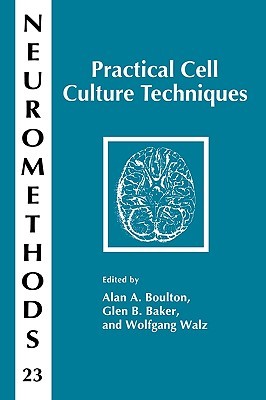
- We will send in 10–14 business days.
- Publisher: Humana Press
- ISBN-10: 0896033481
- ISBN-13: 9780896033481
- Format: 15.2 x 22.4 x 2.5 cm, minkšti viršeliai
- Language: English
- SAVE -10% with code: EXTRA
Practical Cell Culture Techniques (e-book) (used book) | bookbook.eu
Reviews
Description
Most cells will survive removal from the natural mic- environment of their in vivo tissue and placement into a sterile culture dish under optimal conditions. Not only do they survive, but they also multiply and express differen- ated properties in such a culture dish. A few cells do this in suspension, but most will need some kind of mechanical support substituting for their natural connections with other cells. The surface of a culture dish that might have to be coated is usually sufficient. The recent trend to standa- ization of conditions and the existence of commercial ent- prises with adequate funds and specializing in the needs of scientists were responsible for the tremendous proliferation of cell culture techniques in all fields of research in the last 20 years. No longer does a scientist have to concentrate all his/her efforts on that technology; the new trends make it feasible to employ cell culture techniques as only one of the many methods available in a small corner of a larger research laboratory. Some areas of research depend more heavily than others on cell culture techniques. Neuroscience is one of the areas that has developed hand in hand with the prol- eration of cell culture methodology. Molecular biological aspects, cell differentiation and development, neurophy- ological and neurochemical studies, as well as investigations into the nature of various diseases are now to a large extent dependent on the use of cell cultures.
EXTRA 10 % discount with code: EXTRA
The promotion ends in 21d.23:12:11
The discount code is valid when purchasing from 10 €. Discounts do not stack.
- Publisher: Humana Press
- ISBN-10: 0896033481
- ISBN-13: 9780896033481
- Format: 15.2 x 22.4 x 2.5 cm, minkšti viršeliai
- Language: English English
Most cells will survive removal from the natural mic- environment of their in vivo tissue and placement into a sterile culture dish under optimal conditions. Not only do they survive, but they also multiply and express differen- ated properties in such a culture dish. A few cells do this in suspension, but most will need some kind of mechanical support substituting for their natural connections with other cells. The surface of a culture dish that might have to be coated is usually sufficient. The recent trend to standa- ization of conditions and the existence of commercial ent- prises with adequate funds and specializing in the needs of scientists were responsible for the tremendous proliferation of cell culture techniques in all fields of research in the last 20 years. No longer does a scientist have to concentrate all his/her efforts on that technology; the new trends make it feasible to employ cell culture techniques as only one of the many methods available in a small corner of a larger research laboratory. Some areas of research depend more heavily than others on cell culture techniques. Neuroscience is one of the areas that has developed hand in hand with the prol- eration of cell culture methodology. Molecular biological aspects, cell differentiation and development, neurophy- ological and neurochemical studies, as well as investigations into the nature of various diseases are now to a large extent dependent on the use of cell cultures.


Reviews